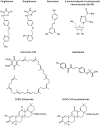Mitochondrial dysfunction in neurodegenerative diseases
- PMID: 22700435
- PMCID: PMC3422529
- DOI: 10.1124/jpet.112.192138
Mitochondrial dysfunction in neurodegenerative diseases
Abstract
Neurodegenerative diseases are a large group of disabling disorders of the nervous system, characterized by the relative selective death of neuronal subtypes. In most cases, there is overwhelming evidence of impaired mitochondrial function as a causative factor in these diseases. More recently, evidence has emerged for impaired mitochondrial dynamics (shape, size, fission-fusion, distribution, movement etc.) in neurodegenerative diseases such as Parkinson's disease, Huntington's disease, amyotrophic lateral sclerosis, and Alzheimer's disease. Here, we provide a concise overview of the major findings in recent years highlighting the importance of healthy mitochondria for a healthy neuron.
Figures
References
-
- Beal MF. (2005) Mitochondria take center stage in aging and neurodegeneration. Ann Neurol 58:495–505 - PubMed
-
- Beal MF. (2007) Mitochondria and neurodegeneration. Novartis Found Symp 287:zpg183–192; discussion 192–186 - PubMed
-
- Beal MF. (2009) Therapeutic approaches to mitochondrial dysfunction in Parkinson's disease. Parkinsonism Relat Disord 15 (Suppl 3):S189–S194 - PubMed
-
- Beal MF. (2011) Neuroprotective effects of creatine. Amino Acids 40:1305–1313 - PubMed
Publication types
MeSH terms
Grants and funding
LinkOut - more resources
Full Text Sources
Other Literature Sources
Medical


